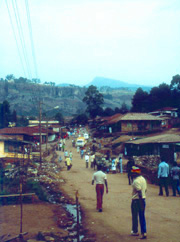This article first appeared
in Lonely Planet, "Africa on a Shoestring"
TOURIST VISA NO. 001
by David W. Bennett 
I knew that Equatorial Guinea
was off the beaten track, but I didn't fully realize the remoteness
of the place until I looked down at my freshly stamped passport.
I had just been issued Tourist Visa No. 001.
Actually my presence in the country
was quite accidental. My original intention was to travel overland
from Cameroon to Gabon, bypassing Equatorial Guinea. Upon my
arrival in Cameroon, however, the authorities insisted that I
purchase an onward air ticket. Financial considerations and my
southward destination made me decide to take the weekly flight
to the Guinean town of Bata. My map showed it to be a mere 125
kms by road from the Gabonese border.
 My
outdated guide book described Bata as a thriving commercial centre
with a population of some 30,000 people. I knew, of course, that
things had probably changed. Six months earlier, a coup had deposed
President Macias Nguema, one of Africa's most tyrannical dictators.
During his 10 year rule, many people disappeared, the country's
economy collapsed, and half the population was forced to flee.
This information didn't fully prepare me for what I found. The
centre of Bata was a virtual ghost town. The handsome Spanish
colonial buildings were boarded up, and the well maintained streets
were empty of both people and vehicles. I surmised that the refugees
had little reason to return here from the relative prosperity
of Cameroon or Gabon.
My
outdated guide book described Bata as a thriving commercial centre
with a population of some 30,000 people. I knew, of course, that
things had probably changed. Six months earlier, a coup had deposed
President Macias Nguema, one of Africa's most tyrannical dictators.
During his 10 year rule, many people disappeared, the country's
economy collapsed, and half the population was forced to flee.
This information didn't fully prepare me for what I found. The
centre of Bata was a virtual ghost town. The handsome Spanish
colonial buildings were boarded up, and the well maintained streets
were empty of both people and vehicles. I surmised that the refugees
had little reason to return here from the relative prosperity
of Cameroon or Gabon.
This conclusion did nothing to
alleviate my present predicament, however. Knowing there to be
no flights, I resigned myself to the possibility to having to
walk to Gabon. After about half an hour, I was surprised to come
upon an apparently well-populated thatched suburb. I say surprised,
but after travelling in Africa for a while, nothing seems that
surprising. I, therefore, did not find it strange to hear the
sound of a fifteen year old Beatles recording blaring from a
large thatched building. Nor did I find it that strange to enter
the building and find a well-stocked bar and about one hundred
dancing patrons, eighty of whom were young women. I am sure the
most bizarre event to occur that day was the entrance of a lone
white man, with a bag strapped to his back.
In any case, I settled down to
enjoy a few beers, answer curious questions and gather more information.
Amidst many offers of overnight accommodation, I was able to
ascertain that a vehicle would be making its weekly journey to
Acalayong, the southernmost town, the very next day
The next morning, a decrepit
pickup truck did, indeed, turn up. I thankfully scrambled into
the back with sacks of grain, baskets of live chickens and about
fifteen other passengers. Apart from one small village, there
was very little to see during the eight hour journey. The road
was in deplorable condition, practically swallowed up by the
dense jungle which closed in tightly on both sides. By the time
the truck wheezed into Acalayong, I was alone, my fellow passengers
having disappeared into the bush along the way.
Acalayong consisted of thirty
huts huddled on the shore of a broad estuary. At the shallow water's edge was beached
a flotilla, of hollowed-out log canoes; some sporting
outboard motors. After intense bargaining, one of the owners
agreed to take me across the estuary to Gabon. Soon, we were
under way, skimming over the water which occasionally surged
over the prow of the low sitting canoe.
We must have travelled a good
three hours before the engine sputtered to a halt. The estuary
had widened considerably at this point and the change in water
colour indicated that we were geographically in the Atlantic
Ocean. Apart from a few nearby islets, land appeared to be very
far away indeed. I was, therefore, greatly relieved when the
current carried us to one of these islets, rather than out to
sea.
To be truthful, when we landed,
I really was surprised. There was a village on this ½
sq. km. dot of land, and I was surely the first traveller to
ever visit it. Not only that, but the friendly villagers considered
me to be an honoured guest who had obviously come there to settle.
By nightfall, a reed hut had been constructed for me to live
in. Then I, and the entire village sat down to a feast of grilled
fish, manioc and copious quantities of palm wine. This was followed
by dancing, drumming, and drinking long into the night. It was
very late when I finally staggered to my hut and I did not have
the inclination to reflect on my onward journey. Were I feeling
romantic, I may have conjured up a multitude of exotic, Robinson
Crusoe-style scenarios. But sleep intervened and I awoke to the
reality of a buzzing outboard motor. And so it was, with the
entire village enthusiastically waving farewell, that the possessor
of Tourist Visa No. 001 finally departed Equatorial Guinea.
David W. Bennett ©
1985 - 2000

